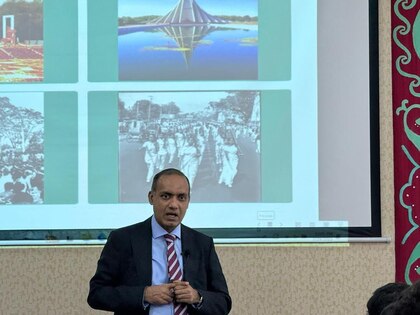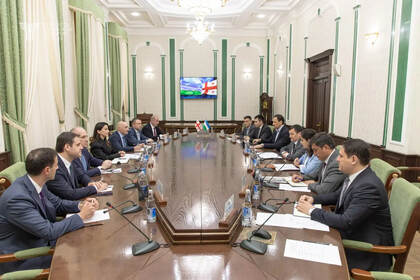The President Shavkat Mirziyoyev familiarized himself with a presentation on measures to prevent and eradicate petty corruption at the government meeting on Tuesday.
The reasons for the spread of petty corruption, weak links in the system and proposals for strengthening prevention were discussed at the meeting.
According to the presidential press service, up to 75% of all corruption cases in Uzbekistan are the so-called petty corruption cases - at the level of cities and districts. We are talking about situations in mayor’s offices, banks, cadastral and tax services, where bureaucracy and corruption loopholes still exist.
According to the April 21, 2025 presidential decree, a department for the analysis of factors contributing to corruption was created within the Prosecutor General's Office.
Specialists travel to the provinces to study the real causes and conditions under which corruption occurs. More than 200 researchers and scientists in the prosecutor's office system, as well as over 100 thousand law enforcement officers are involved in this work, the statement said.
The President called for focusing not only on combating the consequences, but also on eliminating the causes of this phenomenon. He stressed that corruption continues to be one of the most pressing problems, especially at the district and city levels. Preventive mechanisms that completely eliminate such conditions are not yet sufficient.
"The item included in the agenda is very important. We must find an answer to the question of how to identify and eliminate the factors of corruption. For many years, this problem has remained unattended and caused suffering to our people. Despite having all the powers, we continue to address mainly the consequences of corruption, and its causes remain on the sidelines," he said in a story on the Uzbekistan 24 TV channel.
According to him, 2,431 corruption crimes have been registered in the country year-to-date, including 12 at the national level, 171 at the provincial level, 2,156 at the district level, and 92 at the mahalla level.
“People are not happy with mayor’s offices, banks, and cadastral services. It would be correct to say that bureaucracy and corruption loopholes have not been completely eliminated. Therefore, the Prosecutor General must propose a system in which the activities of government agencies will be assessed not only by reducing the number of corruption cases, but also by the number of violations prevented,” Mirziyoyev emphasized.
He also drew attention to the low efficiency of oversigh bodies.
“There are 43 control bodies in our country, employing 13.5 thousand people. All ministries have compliance control units, with a total of 1,300 employees. However, in these structures themselves, which are responsible for preventing violations, over 15 thousand cases of violations were committed. The prosecutor general must also submit proposals to improve the effectiveness of control bodies,” the president said.
The head of state also touched upon illegal land sales. According to him, over the past two years, 5,000 hectares of land have been stolen in 2,700 cases. Employees of mayor’s offices, cadastral and construction authorities themselves are involved in these violations.
In this regard, the president gave directives to conduct an in-depth analysis of data from the cadastral service, the Uzbekcosmos agency, construction and other departments, as well as to eliminate the conditions for such cases.
The head of state also pointed out the need for complete digitalization of the prosecutor's office system and the introduction of digital control in all areas.
At a government meeting on March 5, the president said that the fight against corruption should begin with eradicating its roots - excessive luxury and ostentatious wealth. According to him, some officials, instead of serving as an example of modesty, become hostages to false values and strive for enrichment. Then Shavkat Mirziyoyev instructed to speed up the adoption of the declaring the income of civil servants law; this system is planned to be introduced from 2017. The document was supposed to be submitted for consideration before April 1, but it has not yet been adopted. The President also proposed introducing liability for illegal enrichment, which was discussed in 2021.
Corruption is rampant in Uzbekistan to the point that it became a system replacing the normal relations. Virtually every single affair, matter or problem can be settled through a bribe or an acquaintance, with government officials who could allow anything for a sufficient kickback payment.
Taking bribes and embezzlement of public funds is rampant in Uzbekistan, but arrests of governors, mayors and other top government officials accused of graft have been occasionally occurring over the last one year or so. At the same time, low wages of Uzbek civil servants is not helping to deter corruption, when various level public servants make around 200-300 USD in salary, whilst handling decisions, like issuance of permits, waivers and etc., which could involve bribes between 20,000-500,000 USD and over, then the temptation is overwhelming.
The situation is not being helped either with lenient punishment for such crimes, between 8 to 10 years in prison, but which could be cut down to 3-4 years, if the right sequence of actions is taken and the right persons are taken care of. So in the end of the day, an embezzler, having pocketed serious sums of cash in a number of detected and undetected bribetaking, serves 3-4 years in prison in relatively comfortable conditions, if again the right officials are taken care of, and will be well off (100,000+) when he is out of the prison. And what is even more scandalous, those people relaunch their civil careers. So the equation is largely pro-embezzlement and pro-corruption.














